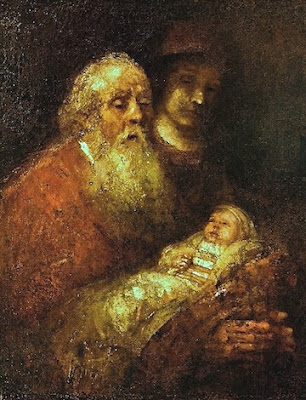Fear Of The Lord: The Presentation of Jesus In The Temple
 |
| Simeon in the Temple (Rembrandt, 1669) |
F
ear of the Lord is the beginning of wisdom (cf. Psalm 110:10). Last among seven gifts of the Spirit but it is the most foundational for without it the soul will fail to rise to receive the other gifts. By virtue of its being a gift of the Spirit, how does this help us in our relationship with God?
There are two aspects of the fear of the Lord. First, St Augustine calls it ‘human fear’. For St Ignatius he calls it ‘servile fear’. It is a lower or imperfect kind of fear. Some examples of this are fear of Hell, fear of condemnation, or fear of the unknown. These are also considered legitimate fears but they are imperfect. When we approach the Sacrament of Reconciliation it is good to scan our conscience to check whether or not we are approaching the sacrament out of such fear. When we were taught catechism as a child we were probably taught about the frightening effects of sin and thereby evoking fear in us. There are people who grow up but they do not outgrow this initial human fear of approaching God.
Fr Florencio Segura SJ defines fear as a passivity before something that has not yet come to pass. And as it still has not come, we cannot control it and so we wait for it passively. Christ, in Gethsemane, passed through a kind of fear. He knew that he will be taken to the tribunals before the authorities and he will have to react or respond to them. Even his silence was a kind of response. For the most part of Jesus' Passion he simply waited for that which closed in on him from all fronts. Jesus too, as a human being, was afraid. But he knew very well that all mortal injury will pass away. He held on to the love of his Father in heaven that will never pass away. If we ask, “When Jesus was afraid in Gethsemane was his fear a human fear–fear of being condemned?”
Second aspect of fear of the Lord is ‘chaste fear’ which is borne out of pure love. This is the gift needed for making a perfect act of contrition to receive God’s healing and forgiveness through the Sacrament of Reconciliation. Last March 20, 2020, Pope Francis said in his homily, “I know that many of you go to confession before Easter… Many will say to me: ‘But Father… I can't leave the house and I want to make my peace with the Lord. I want Him to embrace me… How can I do that unless I find a priest?' Do what the catechism says. It's very clear. If you don't find a priest to go to confession, speak to God. He's your Father. Tell Him the truth: ‘Lord. I did this and this and this. Pardon me.’ Ask His forgiveness with all your heart with an act of contrition, and promise Him, ‘afterward I will go to confession.’ You will return to God's grace immediately. You yourself can draw near, as the catechism teaches us, to God's forgiveness, without having a priest at hand.” In extraordinary circumstances where we cannot get to confession, we can make an act of perfect contrition, which is sufficient to have our sins forgiven.
Many of us, including myself, fail to grasp the meaning of perfect contrition. A perfect contrite heart approaches God primarily with the desire to be with our loving God and not just the desire to shun hell or damnation. Our Church of course does not impose perfection but it is important that we feel ourselves progressing to come closer and closer to God with the perfect intention in mind. St Ignatius in the last annotation of the Spiritual Exercises (370) uses the term "filial fear" to refer to this more perfect kind of coming before God.
Finally, in line with the story of the Presentation of the child Jesus in the Temple, we can pose another question, “What did Simeon feel when he saw the child Jesus?” Knowing perhaps that he was getting older and nearer to the end of his life, we can guess that he was afraid perhaps of leaving the world empty-handed. We can infer that he was afraid because of what we hear him say in the gospel. He had fear but not until he saw the messiah with his own eyes and held him in his own arms. In his Nunc Dimittis–Canticle of Praise–he said he was ready to die. I think this is what perfect contrition is all about–being ready to face death knowing that God’s desire to be with us far exceeds any human longing and desiring. Perfect fear of the Lord is indeed a gift of the Spirit that we must desire every waking day. Simeon was given this spiritual gift no doubt. During the long wait for the coming of the Messiah, he simply kept the faith with wakefulness. May we all be like Simeon who not only longed to see God, but longed to receive God’s assurance that God will be with him always until the end. May we not be asleep but fully awake to receive the gift of self of our Lord to all of us. Amen. Fr JM Manzano SJ

This comment has been removed by the author.
ReplyDelete